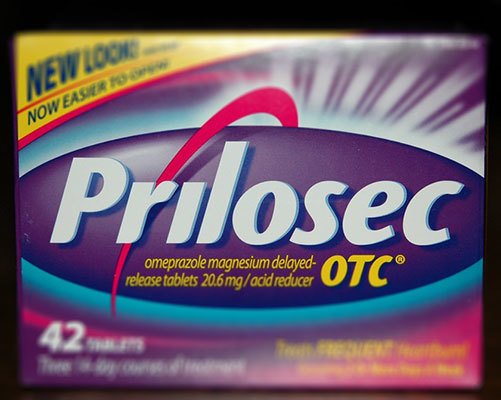Prilosec lawsuits are mass tort claims against pharmaceutical companies for failing to warn doctors and patients about the serious and potentially fatal side effects associated with the stomach acid pill, Prilosec. These side effects are similar to other proton pump inhibitor pills, including Nexium, and include bone fractures, an increased risk of coronary artery disease, acute interstitial nephritis, chronic kidney disease and even renal failure.
In this article, our defective drug attorneys show how Prilosec works, how it is similar to Nexium, and the side effects that Prilosec can cause. We will then discuss the PPI litigation lawsuits that have been filed over the side effects of Prilosec. Finally, we will turn to the compensation that you can recover if you have been the victim of Prilosec.
- 1. How Prilosec works
- 2. Side effects
- 3. Prilosec lawsuits allege “failure to warn”
- 4. Multidistrict litigation (MDL)
- 5. Your options if you have suffered kidney problems after taking Prilosec
- 6. Call our defective drug attorneys for legal help

Omeprazole is a proton pump inhibitor.
1. How Prilosec works
Prilosec (the brand name of omeprazole) is a proton pump inhibitor (PPI). All PPIs reduce the amount of acid produced and secreted in a patient’s stomach by reducing the effectiveness of the proton pump in gastric parietal cells. These cells are located in the lining of the stomach, and are the last step in the process that produces stomach acid.
By blocking the proton pump, the use of proton pump inhibitors can help treat numerous medical conditions, including:
- Acid reflux disease, or gastroesophageal reflux disease (GERD),
- Heartburn,
- Esophagus erosion (erosive esophagitis),
- Peptic ulcers,
- Zollinger-Ellison syndrome, an underlying condition that leads to peptic ulcers,
- Gastric ulcers, particularly for patients who need nonsteroidal anti-inflammatory drugs (NSAIDs), and
- Gastrointestinal ulcers associated with Chron’s disease.
These are some of the most common medical conditions in the world, so it should come as little surprise that Prilosec is one of the most widely-used drugs in the U.S., particularly since generic versions of the drug first hit the market in 2001 and is available over-the-counter.
1.1 Relationship with Nexium
One thing that has limited the use of Prilosec otc in recent years has been the somewhat controversial release of Nexium.
Both Prilosec and Nexium (Esomeprazole) are proton pump inhibitors that treat the same medical conditions. They are also both designed by the pharmaceutical company AstraZeneca.
Prilosec, however, is an older drug. It was first sold as a PPI in the U.S. in 1989. This meant that Prilosec’s patent in the U.S. expired in 2001, allowing other drug manufacturers to copy its chemical properties and sell generic versions.
Because the presence of generic versions of Prilosec on the market made its profits crumble, AstraZeneca got another patent for Nexium, another PPI. Controversially, Nexium is identical to Prilosec in every way, except its chemical structure is a mirror image of Prilosec. Nevertheless, the U.S. Food and Drug Administration (FDA) approved Nexium for medical use in the U.S. in 2000 – right as Prilosec’s patent was about to expire.1 Since then, AstraZeneca has aggressively marketed Nexium as a replacement for Prilosec, even though the drugs are no different from one another.2
Other heartburn drugs include Prevacid, Protonix, and Zantac. All these heartburn medications have been the subject of lawsuits.
2. Side effects
Numerous side effects have been linked to Prilosec. Some of the most common include:
- Headache,
- Dizziness,
- Cough,
- Upper respiratory tract infections, including sinus infections and laryngitis,
- Sore throat,
- Abdominal pain,
- Nausea,
- Constipation,
- Diarrhea,
- Vomiting,
- Regurgitation of stomach acid,
- Gas,
- Back pain, or
- Clostridium difficile
Prilosec has also been connected to some far more serious side effects, some of which can be debilitating or even fatal:
- Acute interstitial nephritis, or the swelling of the area of the kidney known as the interstitium,3
- Risk of fractures to bones,4
- When taken with blood thinners, a higher risk of coronary artery disease,5
- Risk of heart attack,
- Pneumonia,6 and
- Chronic kidney disease, acute kidney injury, and renal failure / kidney failure (which may require dialysis or a kidney transplant).7
Out of these severe side effects, the risks for acute interstitial nephritis – a common precursor to chronic kidney disease and renal failure – are significant. As a result, a disturbingly high number of patients who have taken Prilosec for long periods of time develop kidney disease. One study found that people who take PPIs, including Prilosec, have a 50% higher likelihood of developing chronic kidney disease than those who do not.8
The length of time that a patient takes the drug matters. According to another study, patients who take PPIs like Prilosec do not have an elevated risk for chronic kidney disease if they take the drug for less than 30 days (short term). However, they are nearly twice as likely to develop chronic kidney disease if they take a PPI for between 31 and 90 days, and were more than twice as likely to develop chronic kidney disease or renal failure if the use of PPIs was for more than 90 days (long-term use).9
Despite these dangers, Prilosec has long been marketed as a stomach acid pill that people can take for as long as they have symptoms.

At no point has AstraZeneca warned patients or prescribing doctors about the drastically increased risk for kidney problems associated with omeprazole.
3. Prilosec lawsuits allege “failure to warn”
At no point has AstraZeneca warned patients or prescribing doctors about the drastically increased risk for kidney problems associated with Prilosec. In fact, the drug company has refused to even acknowledge the problem.
Because this lack of disclosure put innocent people at risk of a serious medical condition and prevented them from making an informed decision about their health, it has led to numerous lawsuits against AstraZeneca. These lawsuits all claim that this amounted to a defective warning.
“Failure to warn” lawsuits like these are based on a drug maker’s legal duty to disclose the potential for side effects related to their drug. Failure to warn medical professionals and patients of the potential for harm associated with their drug can lead to drug companies being held liable for the injuries they have caused.
Because studies have shown that there was a connection between chronic kidney disease and proton pump inhibitors since the 1990s,10 lawsuits against AstraZeneca for the side effects of Prilosec have gained traction in court.
4. Multidistrict litigation (MDL)
Because numerous people from across the U.S. have suffered similar kidney problems from taking Prilosec, the failure to warn lawsuits against AstraZeneca have been ripe for multidistrict litigation, or MDL. MDL consolidates all lawsuits into one court for pretrial proceedings, like discovery of evidence and preliminary motions.
The lawsuits for kidney problems from all PPIs, including Prilosec, have been consolidated into an MDL in the District Court of New Jersey.11
5. Your options if you have suffered kidney problems after taking Prilosec
If you think that you may have suffered kidney problems from Prilosec, the first thing to do is talk to your doctor. The kidney damage that PPIs cause is difficult to detect, and does not present the classic three symptoms of kidney damage – fever, rash, and eosinophilia. Without these symptoms, many doctors do not think to test your kidney function, leaving many cases of chronic kidney disease undiagnosed until it is too late to correct.
Scheduling a doctor’s appointment soon is essential because the risks for serious kidney problems increase substantially the longer you take the drug.
If you have suffered kidney damage, the next step is to talk to a lawyer to discuss your legal options. Filing a personal injury lawsuit against AstraZeneca and joining the MDL in New Jersey federal court can be the best way to quickly recover the compensation that you need to recover from your injuries, including:
- Past medical expenses,
- Future anticipated medical bills,
- Lost wages or income,
- Reduced earning capacity associated with your injuries, and
- Compensation for the pain and suffering you have endured.
Just like talking with your doctor, though, seeking legal help is best done soon. The statute of limitations forces you to file your claim within a certain amount of time – usually two years after your injuries, but this time varies depending on where the injury occurred in the United States. Talking with an attorney well before this timeframe is due to expire can let your lawyer gather the evidence necessary to put together your best claim for compensation.
6. Call our defective drug attorneys for legal help

Call our law firm for a free case evaluation and to discuss creating an attorney-client relationship.
The mass tort and defective drug lawyers at the Shouse Law Office strive to represent victims of drugs and medications that hurt innocent people. Call us toll-free or contact us online if you or a loved one has been hurt by Prilosec and want to invoke your rights to compensation. We offer free consultations.
Legal References:
- FDA Approval Letter for Nexium.
- Josh Bloom, “Nexium: The Dark Side of Pharma,” American Council on Science and Health (January 18, 2017).
- Linda Härmark, Hans E van der Wiel, Mark C H de Groot, and A C van Grootheest, “Proton pump inhibitor-induced acute interstitial nephritis,” British Journal of Clinical Pharmacology 64(6):819-23 (December 2007).
- Yang YX, Lewis JD, Epstein S, Metz DC, “Long-term proton pump inhibitor therapy and risk of hip fracture,” JAMA 296(24):2947-53 (December 27, 2006).
- Niu Q, Wang Z, Zhang Y, Wang J, Zhang P, Wang C, Yin X, Hou Y, “Combination Use of Clopidogrel and Proton Pump Inhibitors Increases Major Adverse Cardiovascular Events in Patients With Coronary Artery Disease: A Meta-Analysis,” Journal of Cardiovascular Pharmacology and Therapeutics 22(2):142-52 (March 22, 2017).
- Herzig SJ, Howell MD, Ngo LH, Marcantonio ER, “Acid-suppressive medication use and the risk for hospital-acquired pneumonia,” JAMA 301(20):2120-8 (May 27, 2009).
- Benjamin Lazarus, MBBS, Yuan Chen, MS, Francis P. Wilson, MD, MS, Yingying Sang, MS, Alex R. Chang, MD, MS, Josef Coresh, MD, PhD, and Morgan E. Grams, MD, PhD, “Proton Pump Inhibitor Use and Risk of Chronic Kidney Disease,” JAMA Internal Medicine 176(2):238-46 (February 1, 2016).
- See note 7.
- Yan Xie, Benjamin Bowe, Tingting Li, Hong Xian, Sumitra Balasubramanian and Ziyad Al-Aly, “Proton Pump Inhibitors and Risk of Incident CKD and Progression to ESRD,” Journal of the American Society of Nephrology, 27(10):3153-63 (October 2016).
- See Ruffenach SJ, Siskind MS, Lien YH, “Acute interstitial nephritis due to omeprazole,” American Journal of Medicine 93(4):472-3 (October 1992).
- MDL 2789, In Re: Proton-Pump Inhibitor Products Liability Litigation.
